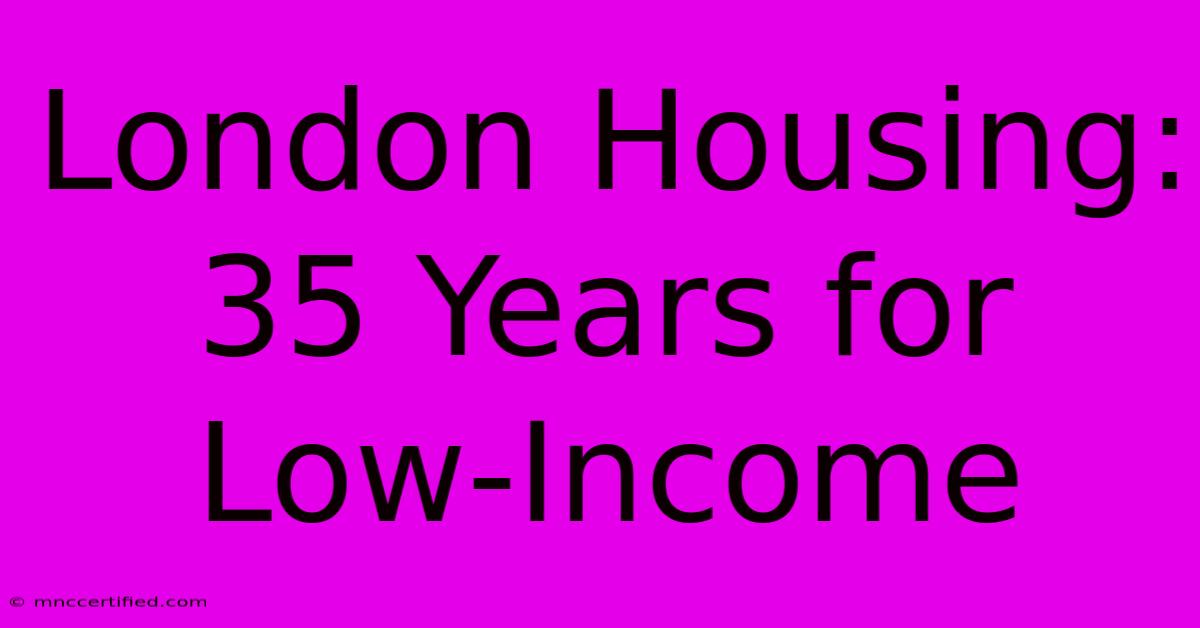London Housing: 35 Years For Low-Income

Table of Contents
London Housing Crisis: The 35-Year Wait for Low-Income Families
London's housing market is notoriously challenging, but for low-income families, the situation is particularly dire. The reality for many is a staggering wait, sometimes stretching to 35 years or more, for affordable social housing. This article delves into the complexities of this crisis, exploring its causes, consequences, and potential solutions.
The Brutal Reality of London's Waiting Lists
The sheer length of waiting lists for social housing in London is a stark indicator of a systemic failure. While the average wait time can vary by borough and specific circumstances, anecdotal evidence and reports frequently highlight waits exceeding 35 years. This isn't just a statistic; it represents a generation of families denied stable, affordable housing, impacting their well-being, education, and future prospects. The dream of owning a home in London, for many low-income earners, remains a distant and unattainable fantasy, replaced by the harsh reality of a prolonged wait for even basic, affordable housing.
Understanding the Root Causes
Several intertwined factors contribute to this devastatingly long wait time for low-income Londoners:
-
Chronic Underfunding: Decades of underinvestment in social housing have led to a severe shortage of affordable units. Reduced government funding and a lack of sustained commitment to building new social housing stock have exacerbated the problem.
-
Rapid Population Growth: London's population continues to grow, increasing demand for housing while the supply remains stagnant. This surge in demand, particularly in already strained areas, intensifies competition and pushes up prices, making it even harder for low-income families to secure housing.
-
High Property Prices and Rents: London's exorbitant property prices and rental costs are a major driver of the housing crisis. Low-income families are simply priced out of the private market, leaving them entirely reliant on the already overstretched social housing system.
-
Complex Application Processes: The application process for social housing is often lengthy, complex, and bureaucratic, further delaying access for those who desperately need it. Navigating the system can be overwhelming, particularly for vulnerable families without adequate support.
-
Lack of Affordable Housing Alternatives: The shortage of affordable housing extends beyond social housing, with limited options for private rental or shared ownership schemes that are accessible to low-income households.
The Devastating Consequences
The protracted wait for social housing has profound consequences for low-income families in London:
-
Housing Instability: Many families face a constant threat of eviction or homelessness due to unaffordable rents or insecure tenancies. This instability has a severe impact on children's education and overall family well-being.
-
Educational Disadvantage: Frequent moves and unstable housing situations disrupt children's education, impacting their academic progress and future opportunities.
-
Health Impacts: The stress and uncertainty associated with housing insecurity can lead to poor mental and physical health outcomes for adults and children.
-
Poverty Trap: The difficulty of accessing affordable housing traps families in a cycle of poverty, making it harder to escape disadvantage and improve their living standards.
Potential Solutions and Paths Forward
Addressing London's housing crisis requires a multi-pronged approach:
-
Increased Investment in Social Housing: Significant increases in government funding are crucial to build a substantial number of new social housing units to meet the overwhelming demand.
-
Streamlined Application Processes: Simplifying and improving the application process for social housing will ensure quicker access for eligible families.
-
Innovative Housing Solutions: Exploring and implementing innovative housing solutions, such as modular construction and shared ownership models tailored to low-income families, can help increase the supply of affordable homes.
-
Planning Reforms: Changes to planning regulations are needed to encourage the construction of more affordable housing units, and zoning policies must reflect the need for diverse housing options.
-
Rent Controls and Regulations: Implementing effective rent controls and regulations can protect renters from exploitative practices and prevent excessive rent increases.
Addressing the 35-year wait for low-income housing in London is a monumental challenge, requiring sustained political will, innovative solutions, and a significant increase in resources. The well-being of thousands of families depends on it. The need for action is urgent; the current system is failing Londoners, and fundamental change is needed to create a more just and equitable housing market. This is not just about numbers; it's about providing families with the stability and security they need to thrive.

Thank you for visiting our website wich cover about London Housing: 35 Years For Low-Income. We hope the information provided has been useful to you. Feel free to contact us if you have any questions or need further assistance. See you next time and dont miss to bookmark.
Featured Posts
-
Mark Pope Bill Keightley And The Louisville Rivalry
Dec 12, 2024
-
Megan Fox Machine Gun Kelly Breakup News
Dec 12, 2024
-
Unintended Randy Moss Diagnosis Reveal
Dec 12, 2024
-
Indias Oil Imports Rise On Festive Demand
Dec 12, 2024
-
Mace Accosting Case Suspects Not Guilty Plea
Dec 12, 2024